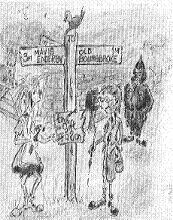
I've just finished Imperium by Robert Harris. It's the story of Roman statesman Cicero's struggle to rise from his comparatively humble roots to become Consul of Rome. You wonder why he bothered because the office only lasted for a year and was shared in any case. No doubt there was money to made. I get the feeling that Harris has had to make a real effort to turn Cicero into some kind of hero, rather than a man on the make which I've no doubt he was.
Inevitably, the book reminded me of I, Claudius, at least the TV version. The dialogue is modern, not lapsing into cod-Latin but avoiding 21st century slang as well. I do have a problem, however, with the modern sensibility of the book. After all, it purports to be the memoir of Cicero's slave and secretary, Tiro, who apparently invented shorthand, a skill which is of great importance in the plot. It also enables Harris to get in a joke of hindsight when Tiro, boasting how easy his system is to learn, claims that one day even women might become secretaries.
Another interesting fact. Why are people seeking political office called 'candidates'? Because a Roman desiring election would wear a toga bleached particularly white - they were normally the natural colour of the wool from which they were made - so that they stood out from the crowd. 'Candida' means white or bright. Ironically, I suppose 'candid' has something to do with it.
Harris is a politico himself and seems keen to draw a few contemporary parallels, as when Tiro sniffs at those politicians who do not write their own speeches but employ slaves to do it. That reminds me of story of the time Churchill flew across the Atlantic to confer with Roosevelt. They came to an important agreement and parted, agreeing to announce it to their respective nations as soon as possible. Roosevelt got his speechwriters onto the job immediately, hoping to beat Churchill to the punch, and was amazed to turn on his radio next morning to hear Churchill make a brilliant address, which he had written on the plane home.
Harris also borrows from Nye Bevan, putting into Cicero's mouth words similar to those aimed at Eden during the Suez affair. 'I am not saying he isn't sincere, but if he is sincere, then he is too stupid to be a Prime Minister.'
When a tribune exercises his right to veto a bill, he is voted out of office before the end of his term, an action rather similar to the 'recall' of California's governor not so long ago. Many Romans see this as a dangerous surrender to demagoguery, and I'm sure many Americans would agree.
Most significant of all, the book records how Pompey fomented and exploited the people's fears of invasion by pirates to set up autocratic government and reduce civil liberties. There are no prizes for guessing the contemporary allusions there.
Every day is a gift. But does it have to be a pair of socks?
Tony Soprano

No comments:
Post a Comment